Russell Street and nearby John Street are both named after Lord John Russell, remembered in the name of this Wetherspoon pub. Lord Russell was MP for Stroud and also the architect of the Great Reform Act of 1832. The pub was previously Stroud’s main post office.
Prints and text about The Lord John.
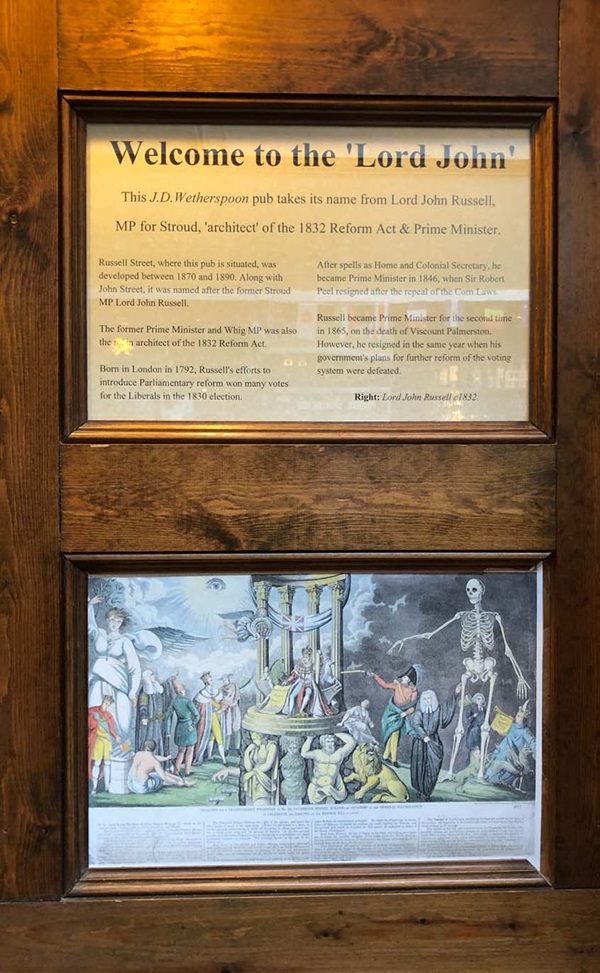
The text reads: This J D Wetherspoon pub takes its name from Lord John Russell, MP for Stroud, ‘architect’ of the 1832 Reform Act & prime minister.
Russell Street, where this pub is situated, was developed between 1870 and 1890. Along with John Street, it was named after the former Stroud MP Lord John Russell.
The former prime minister and Whig MP was also the main architect of the 1832 Reform Act.
Born in London in 1792, Russell’s efforts to introduce Parliamentary reform won many votes for the Liberals in the 1830 election.
After spells as home and colonial secretary, he became prime minister in 1846, when Sir Robert Peel resigned after the repeat of the Corn Laws.
Russell became prime minister for the second time in 1865, on the death of Viscount Palmerston. However, he resigned in the same year when his government’s plans for further reform of the voting system were defeated.
Right: Lord John Russell, c1832.
Prints and text about policies and politics.
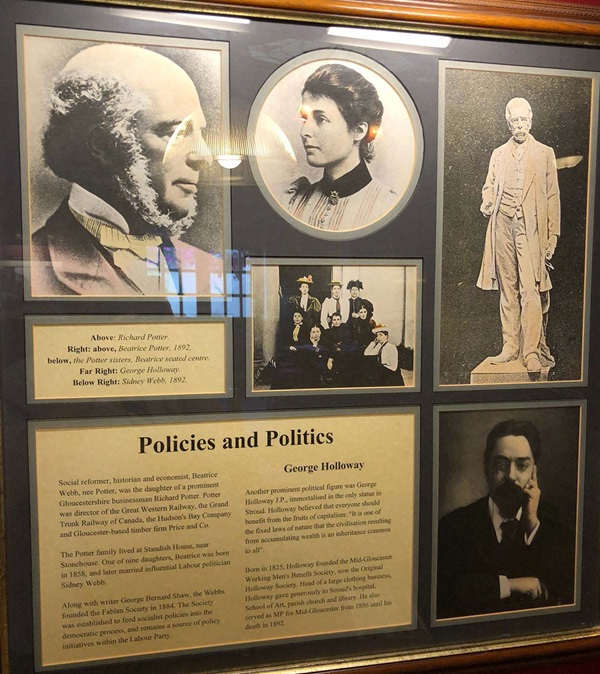
The text reads: Social reformer, historian and economist, Beatrice Webb, nee Potter, was the daughter of a prominent Gloucestershire businessman Richard Potter. Potter was a director of the Great Western Railway, the Grand Trunk Railway of Canada, the Hudson’s Bay Company and Gloucester-based timber firm Price and Co.
The Potter family lived at Standish House, near Stonehouse. One of the nine daughters, Beatrice was born in 1858, and later married influential Labour politician Sidney Webb.
Along with writer George Bernard Shaw, the Webbs founded the Fabian Society in 1884. The Society was established to feed socialist policies into the democratic process, and remains a source of policy initiatives within the Labour Party.
Another prominent political figure was George Holloway JP, immortalised in the only statue in Stroud. Holloway believed that everyone should benefit from the fruits of capitalism: “It is one of the fixed laws of nature that the civilisation resulting from accumulating wealth is an inheritance common to all.”
Born in 1825, Holloway founded the Mid-Gloucester Working Men’s Benefit Society, now the Original Holloway Society, now the Original Holloway Society. Head of a large clothing business, Holloway gave generously to Stroud’s hospital, School of Art, parish church and library. He also served as MP for Mid-Gloucester from 1886 until his death in 1892.
Above: Richard Potter Right: above, Beatrice Potter, 1892, below, the Potter sisters, Beatrice seated centre Far right: George Holloway
Below right: Sidney Webb, 1892.
Prints and text about Stroud’s post office and Rowland Hill.
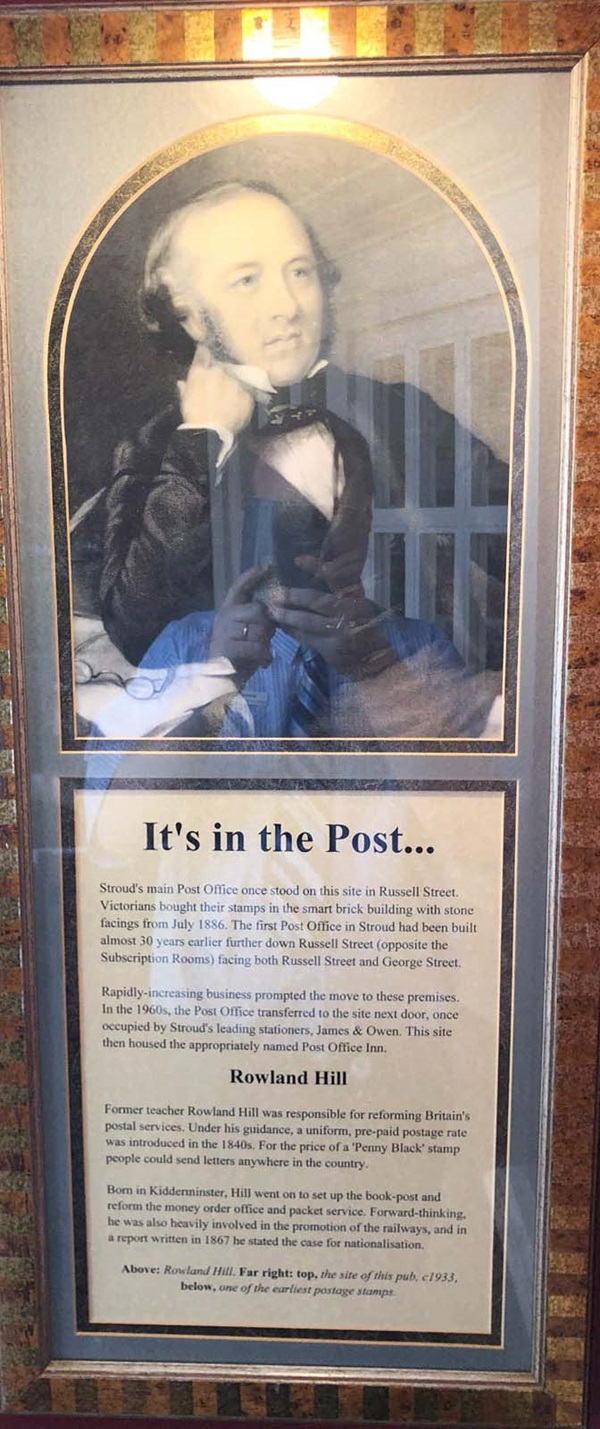
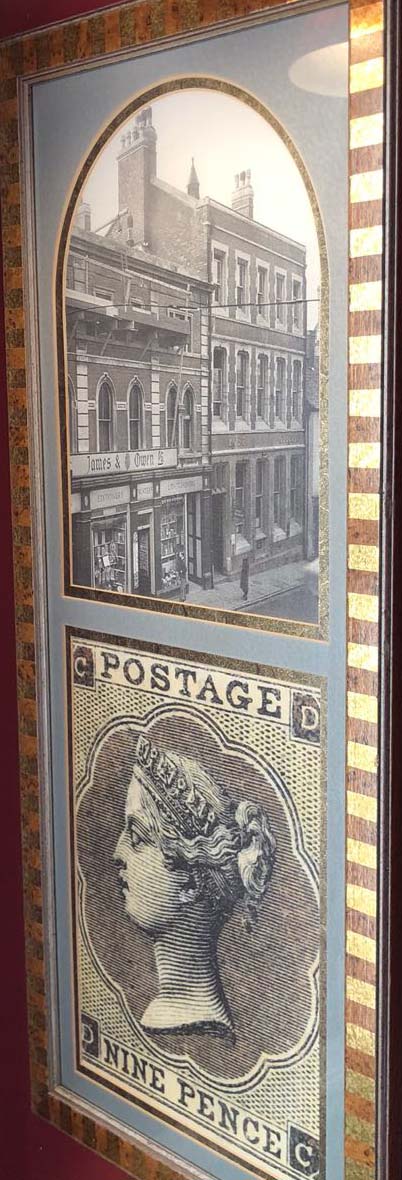
The text reads: Stroud’s main post office once stood on this site in Russell Street. Victorians bought their stamps in the smart brick building with stone facings from July 1886. The first post office in Stroud had been built almost 30 years earlier further down Russell Street (opposite the Subscript Rooms) facing both Russell Street and George Street.
Rapidly-increasing business prompted the move to these premises. In the 1960s, the post office transferred to the site next door, once occupied by Stroud’s leading stationers, James & Owen. This site then housed the appropriately named Post Office Inn.
Former teacher Rowland Hill was responsible for reforming Britain’s postal services. Under his guidance, a uniform, pre-paid postage rate was introduced in the 1840s. For the price of a ‘Penny Black’ stamp people could send letters anywhere in the country.
Born in Kidderminster, Hill went on to set up the book-post and reform the money order office and packet service. Forward-thinking, he was also heavily involved in the promotion of the railways, and in a report written in 1867 he stated the case for nationalisation.
Above: Rowland Hill Far right: top, the site of this pub, c1933, below, one of the earliest postage stamps.
Illustrations and text about religious figures.
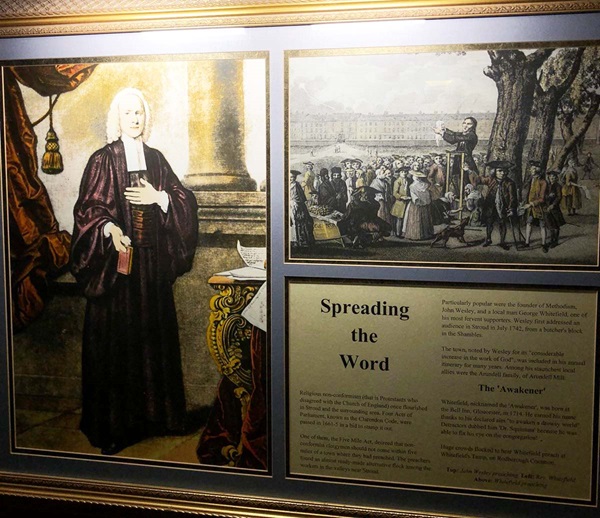
The text reads: Religious non-conformism (that is Protestants who disagreed with the Church of England) once flourished in Stroud and the surrounding area. Four Acts of Parliament, known as the Clarendon Code, were passed in 1661-5 in a bid to stamp it out.
One of them, the Five Mile Act, decreed that non-conformist clergymen should not come within five miles of a town where they had preached. The preachers found an almost ready-made alternative flock among the workers in the valleys near Stroud.
Particularly popular were the founder of Methodism, John Wesley, and a local man George Whitefield, one of his most fervent supporters. Wesley first addressed an audience in Stroud in July 1742, from a butcher’s block in the Shambles.
The town, noted by Wesley for its “considerable increase in the work of God”, was included in his annual itinerary for many years. Among his staunchest local allies were the Arundell family, of Arundell Mill.
Whitefield, nicknamed ‘The Awakener’, was born at the Bell Inn, Gloucester, in 1714. He earned his name thanks to his declared aim “to awaken a drowsy world”. Detractors dubbed him ‘Dr Squintum’ because he was able to fix his eye on the congregation!
Huge crowds flocked to hear Whitefield preach at Whitefield’s Tump, on Rodborough Common.
Top: John Wesley preaching
Left: Rev. Whitefield Above: Whitefield preaching.
Prints and text about Stroud’s literary links.
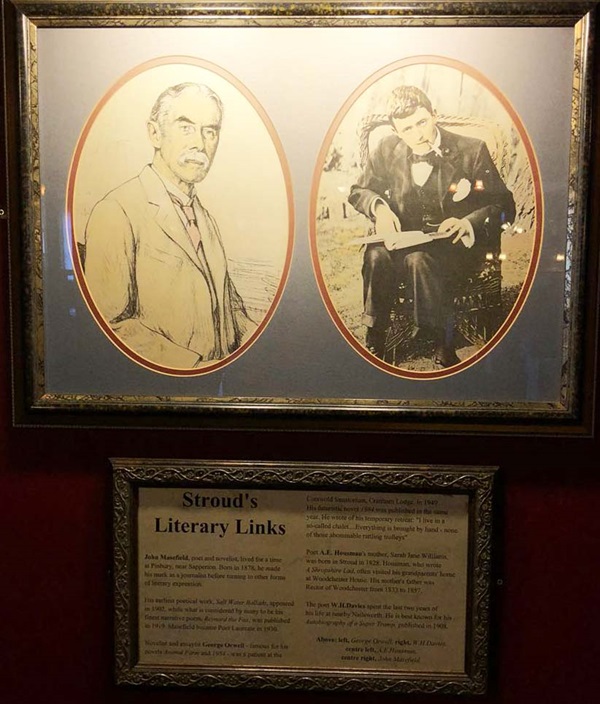
The text reads: John Masefield, poet and novelist, lived for a time at Pinbury, near Sapperton. Born in 1878, he made his mark as a journalist before turning to other forms of literary expression.
His earliest poetical work, Salt Water Ballads, appeared in 1902, while what is considered by many to be his finest narrative poem, Reynard the Fox, was published in 1919. Masefield became Poet Laureate in 1930.
Novelist and essayist George Orwell – famous for his novels Animal Farm and 1984 – was a patient at the Cotswold Sanatorium, Cranham Lodge, in 1949. His futuristic novel 1984 was published in the same year. He wrote of his temporary retreat: “I live in a so-called chalet… Everything is brought by hand – none of those abominable rattling trolleys.”
Poet AE Housman’s mother, Sarah Jane Williams, was born in Stroud in 1828. Housman, who wrote A Shropshire Lad, often visited his grandparents’ home at Woodchester House. His mother’s father was Rector of Woodchester from 1833 to 1857.
The poet WH Davies spent the last two years of his life at nearby Nailsworth. He is best known for his Autobiography of a Super Tramp, published in 1908.
Above: left, George Orwell, right, WH Davies, centre, left, AE Housmann, centre right, John Masefield.
A photograph of George Street, Stroud, c1910.
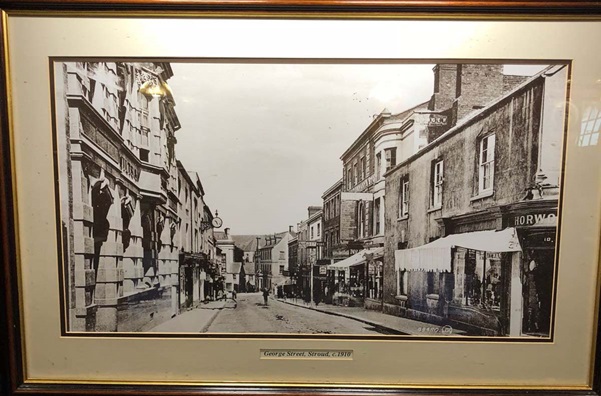
A photograph of Lansdown, Stroud, c1910.
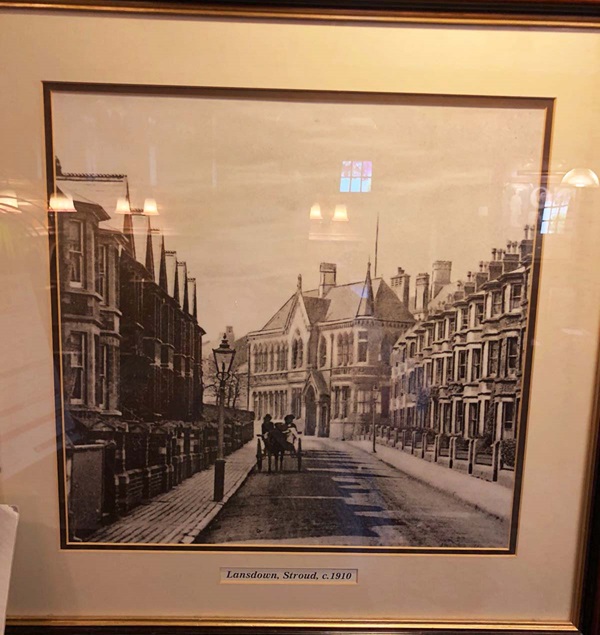
A photograph of King Street, Stroud, c1905.
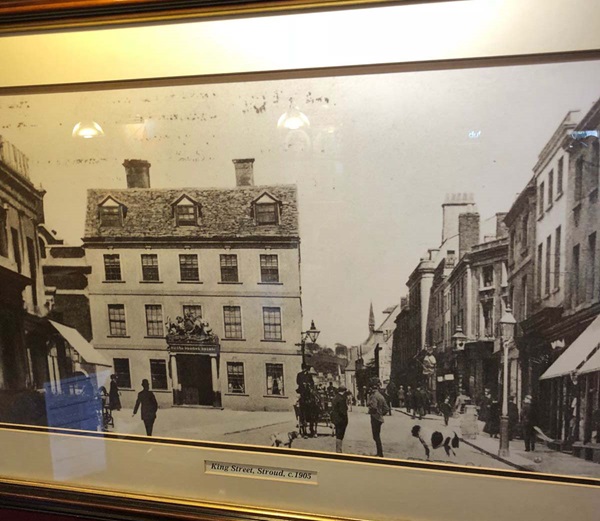
External photograph of the building – main entrance.
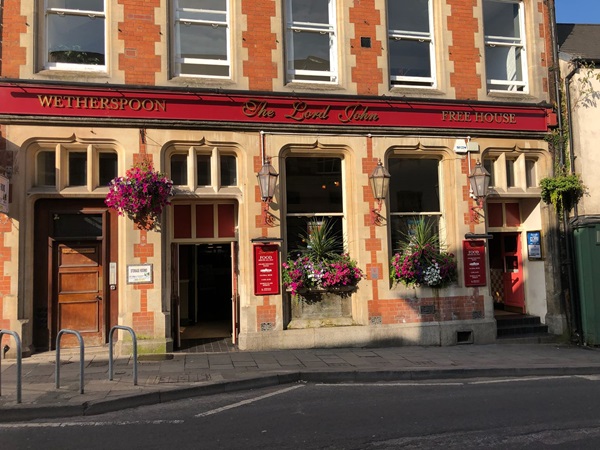
If you have information on the history of this pub, then we’d like you to share it with us. Please e-mail all information to: pubhistories@jdwetherspoon.co.uk